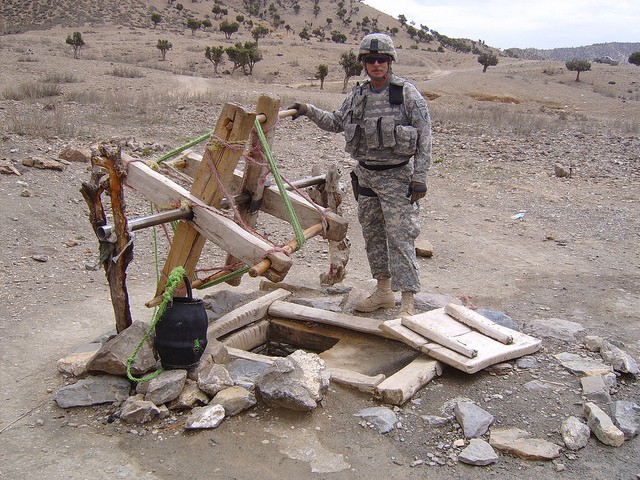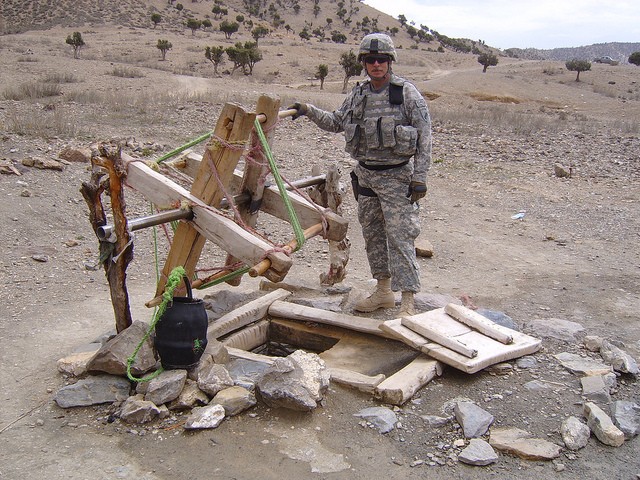
One inch ended Maj. Andy Ingalsbe's service in theater. In September 2009, a sniper's round struck him in the back, one inch below his Kevlar vest. The reservist and his civil affairs team had just completed a humanitarian mission in Afghanistan's Paktika province.
The well-placed projectile inflicted extensive damage. The bullet cracked two vertebras, destroyed Ingalsbe's right kidney, and tore up his liver and digestive tract. Unable to brace himself for the fall, Ingalsbe also injured his neck when his head slammed against the ground.
Surgical teams treated him at FOB Sharana and Bagram Airfield. They also digitally documented Ingalsbe's care in computer systems fielded and supported by the Army's Medical Communications for Combat Casualty Care (MC4) program. His digital medical history helped physicians at Walter Reed Army Medical Center, Washington, D.C., piece together his traumatic story.
"I arrived at Walter Reed five days after my injury, but I regained consciousness on the 18th day," Ingalsbe said. "The doctors told me about my injuries and I required a lot of re-plumbing. Surgeons in Afghanistan removed a kidney and my right colon. The entire time I lived at Walter Reed, the doctors never asked me about any of my prior treatments. They had all of the information in my digital records. One doctor said that I looked better medically in person than what was documented in my chart."
Ingalsbe was devastated by the timing of the injury. For 25 years, he trained for combat as a military policeman. In 2005, he voluntarily came out of retirement to serve in a civil affairs role in order to get to the battlefield.
From 2005 through 2006, he led more than 80 missions throughout Iraq. Ingalsbe's teams dug wells, repaired schools and handed out food. The humanitarian experience came with a price though. An improvised explosive device damaged his hearing, yet he remained committed to the mission. At the end of his tour, Ingalsbe retired for a second time.
In 2008, he returned to active duty and deployed in the same capacity, but this time for one year in Afghanistan. While in theater, he decided to extend for a second year. Two days before he was set to begin another year-long tour, a sniper's bullet ended Ingalsbe's service in theater.
Ingalsbe recuperated at Walter Reed for eight months. The digital history from the battlefield and home enables Maj. Jane Dickler, nurse case manager with the Warrior Transition Brigade at Walter Reed, to keep a close watch on Ingalsbe and others.
"I review the electronic records and treatment plan to make sure my patients receive the medical attention they require," Dickler said. "Since the medical staff captures patient data electronically, it eliminates the need to hunt for paper forms. It also significantly reduces the possibility of losing patient information. My team also reviews appointment schedules so that patients are where they need to be at the correct times."
Ingalsbe underwent a second surgical procedure in March 2010. To repair the damage in his neck, a neurosurgeon inserted two titanium discs, as well a metal plate to hold them in place. Three months after the operation, he transferred to the Community Based Warrior Transition Unit-Arkansas (CBWTU-AR). Ingalsbe continues his rehabilitation at outpatient facilities in his hometown of West Plaines, Mo.
"Many times, being near friends and family are better recuperative agents for certain injuries than a stay in a hospital bed," said Maj. Barbara Schulz, nurse case manager with the CBWTU-AR, who manages Ingalsbe's care. "Patients, such as Ingalsbe, are able to receive medical care in their own communities. I stay in contact on a daily or weekly basis. When Ingalsbe receives physical therapy at his local hospital or meets with his family physician, we receive documentation from the civilian providers. Ultimately, all of the records we collect will go to the Department of Veterans Affairs, allowing future providers to view his complete medical history."
While digital medical records have replaced paper forms, Ingalsbe stays set in his ways. He still collects paper copies of every form from every appointment. After he was shot, the paper folder has since been replaced by a plastic binder. He also has CD-ROMs and DVDs that hold the results from his radiology exams.
"The military is much different today than when I began my career 30 years ago," Ingalsbe said. "For most of my career, Service members kept paper copies of their medical records to protect against a clinic misplacing months or years of medical information. Today, digital notes build upon older records like e-mail messages. I don't have a medical background, but the digital records are pretty easy to follow."
Periodically, Ingalsbe returns to Walter Reed for follow-up appointments with his doctors. He looks forward to the day when he receives medical clearance from both surgeries. When that happens, he will retire from the military for a third and final time. He says that when it comes time for a medical review board to determine his future medical benefits, they will be well-informed.
"Between my paper copies and the digital records in the military's computer system, I have my medical history covered," Ingalsbe said. "The medical board will have a complete medical picture of my military service. I have a lot of good memories from my military career. As a permanent reminder of my deployment to Afghanistan, I have a 12-inch scar on my abdomen and the sniper's round mounted on my wall with my Purple Heart."
Related Links:
Battlefield Medical Records Assist VA Staff with Service Member's Recovery

Social Sharing